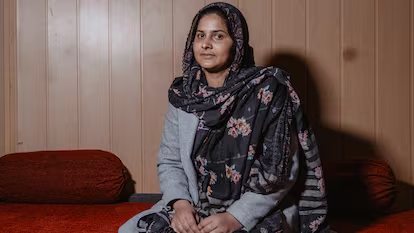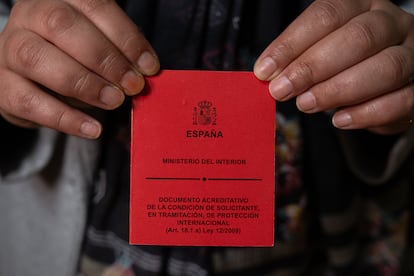Anisa Yousaf, survivor of a forced marriage: ‘Parents should give their daughters freedom of choice’
A Pakistani court ruling declared the arrangement orchestrated by her father from Barcelona and against her will illegal


Anisa Yousaf is now free to marry the man she loves. A family court in Lahore in Pakistan has annulled the forced marriage her father tried to impose on her. During the summer vacations of 2021, Anisa traveled home from Spain to attend her sister’s wedding. But her father had set a trap for her: he informed her that she had to marry a nephew of his, who would then be eligible for a visa to travel to Spain.
Anisa refused to become an economic instrument and to give up her dreams of love. Her father then subjected her to psychological and physical abuse that almost cost her her life. She managed to escape and asked for help from Acesop, a Barcelona-based organization that helps women who are victims of a practice that is still common in rural communities in India and Pakistan. So-called “honor crimes” claim the lives of 500 women every year.
Anisa, now 24, arrives at the organization’s headquarters in the heart of the Raval district, accompanied by her current partner and their two-month-old baby, to tell her story: “Parents should give their daughters freedom of choice. Women should be able to marry the man of their choice. If marriage is imposed, neither the wife nor the husband can be happy and problems arise. I was very unhappy, but now I am very happy that I chose the partner of my own free will, thank God,” she says in Urdu.
The three of them arrived by bus from a small village where they live hidden in a foster home. Anisa is happy after learning of a pioneering sentence that has freed her, definitively, from the yoke of a link she never accepted. But she still feels insecure: “I can’t come to Barcelona because my father lives here. And I’m afraid to go back to Pakistan,” says the young woman, who has applied for political asylum in Spain.
When Anisa escaped from Pakistan, she reported the case in Spain and applied for asylum. The police launched an investigation and, after a while, her father, who also lived in Catalonia, was arrested for the crime of trafficking in human beings for the purpose of forced marriage. She has not spoken to him since. Nor with the rest of her family members, a wound that doesn’t heal. “My family is my husband, my son and me,” she says, looking at her partner, bottle-feeding their baby, who is squinting, about to fall asleep. The couple has known each other since childhood. Their marriage, in fact, was initially arranged by their families. Eventually, they fell in love. “But my father changed his mind. He used me so someone could get papers. It’s something that is normalized here.”
Anisa does not want to remember too much about those weeks in Pakistan in 2021, but the court ruling is detailed. When her father informed her that he was preparing a nikah (marriage contract) with a nephew of his from Gujrat district (about a three-hour drive north of Lahore), Anisa went into shock and refused to sign the papers. The father tried to convince her. But seeing that it was going to be impossible, he attempted to bend her will. He stole her passport and Spanish residency permit and threatened to tear them up so that she could not return to Spain. In the end, with the help of some elders in the community, she managed to recover the documents, escape to Lahore and, from there, board a return flight.

A forged signature
Her father, Muhammad Yousaf, affixed Anisa’s (forged) signature to the marriage contract, which was used by the nephew to proclaim, publicly and privately, that they were married. These claims caused “confusion” in the community and damaged Anisa’s “reputation” and “social consideration,” according to the lawsuit, which, once she was safely in Spain, was filed in Pakistan to have the marriage declared null and void.
The ruling, handed down by a family court judge in Gujrat, Misbah Ul Ain Ayesha, grants her request and concludes that there was never a bond or consummation of the marriage, as she did not give consent or sign any documents, as she ratified during the trial through a Skype video conference. Her lawyer added that the marriage is not only against Sharia law, but also against Pakistan’s family laws, which require that the nikah be made with the consent of the spouses and in the presence of witnesses.
But Anisa’s legal battle is not over. When things had calmed down, the president of the Cultural, Educational and Social Association of Pakistani Women (Acesop), Huma Jamshed Bashir, married her to her current partner through the Muslim rite. This union, however, is not recognized in Spain. Anisa needs the Lahore authorities to quash her forced marriage on the basis of the sentence in order to legally marry in Spain. It is just one of the many steps she must take in a maze of paperwork that now occupies her life: with her asylum application pending, Anisa’s passport has expired; since the consulate cannot renew it because her husband’s name must be on it, she cannot register their child either. “I will be happier when I have been able to regularize my situation and my child’s.” The baby sleeps in a gray stroller, oblivious to the whims of bureaucracy.
Anisa knows she is a survivor. “I came to think that what happened to them could happen to me,” she says of two other young Pakistani women living in Barcelona, Aneesa and Arooj, who in May 2022 (a few months after her) traveled to their country and fell into a similar ruse. They were not so lucky: when they refused to apply for visas for the husbands they were forced to marry, several members of their family, in the district of Gujrat, murdered them. They were 20 and 24 years old, almost the same as Anisa, who encourages women to speak out. “Girls who are forced into marriage, let them come forward and report it. Justice should also believe them, as it has believed me.”
Sign up for our weekly newsletter to get more English-language news coverage from EL PAÍS USA Edition
Tu suscripción se está usando en otro dispositivo
¿Quieres añadir otro usuario a tu suscripción?
Si continúas leyendo en este dispositivo, no se podrá leer en el otro.
FlechaTu suscripción se está usando en otro dispositivo y solo puedes acceder a EL PAÍS desde un dispositivo a la vez.
Si quieres compartir tu cuenta, cambia tu suscripción a la modalidad Premium, así podrás añadir otro usuario. Cada uno accederá con su propia cuenta de email, lo que os permitirá personalizar vuestra experiencia en EL PAÍS.
¿Tienes una suscripción de empresa? Accede aquí para contratar más cuentas.
En el caso de no saber quién está usando tu cuenta, te recomendamos cambiar tu contraseña aquí.
Si decides continuar compartiendo tu cuenta, este mensaje se mostrará en tu dispositivo y en el de la otra persona que está usando tu cuenta de forma indefinida, afectando a tu experiencia de lectura. Puedes consultar aquí los términos y condiciones de la suscripción digital.








































